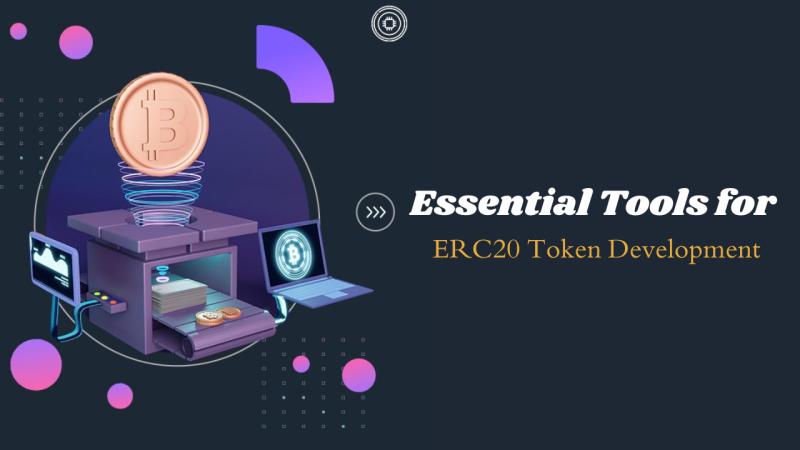Essential Tools for ERC20 Token Development

The Ethereum blockchain has become the gold standard for decentralized applications, and ERC20 tokens play a crucial role in this ecosystem. ERC20 tokens provide a standard for creating fungible tokens, offering flexibility and efficiency for developers. In this blog, we will explore the essential tools you need to develop your own ERC20 token efficiently and effectively.
1. Ethereum Wallets
Before you start programming, you should have an Ethereum wallet to manage tokens and smart contracts. Wallets are also essential for interacting with decentralized applications (dApps) on Ethereum.
MetaMask: One of the most popular Ethereum wallets, MetaMask allows you to interact with dApps directly through your browser. It supports token management and can be easily integrated into any ERC20 token project.
MyEtherWallet (MEW): MEW is a client-side wallet that offers full control of your private keys and is compatible with hardware wallets for enhanced security.
2. An Integrated Development Environment (IDE)
Creating smart contracts necessitates having a well-built platform in which one will develop, compile, and then implement his/her ERC20 token contracts.
Remix IDE: Remix is a web-based integrated development environment devoted solely to Solidity, which is the language used to write smart contracts for Ethereum. They provide a simple user experience for developing and testing new ERC20 tokens and deploying them on Ethereum.
Truffle Suite: Truffle is one of the community’s most well-known tools for crafting Ethereum applications. It includes a testing environment, a means of debugging, and an asset pipeline for contract deployment. Truffle is also compatible with Ganache, the personal blockchain for Ethereum software development.
3. Solidity Programming Language
Smart Contracts, especially the ones created for ERC20 tokens, are typically written in Solidity, the language of Ethereum.
Solidity Documentation: The official documentation on the Solidity website can help one understand the proper syntax for writing ERC20 tokens with Solidity. It is important in development to update the new changes in the language.
4. Blockchain Explorers
After you've deployed your ERC20 token, it's critical to monitor its activities on the blockchain to ensure that everything is fine.
Etherscan: We would particularly like to note that Etherscan is a smart and powerful Ethereum blockchain analytics system. It enables you to view the transactions; keeps records of contract addresses and enables the analysis of every token transfer. You can also choose to get your ERC20 token verified on etherscan for transparency after the deployment of your smart contract.
5. Testing Frameworks
You must put your smart contracts through their paces before putting them into production on the mainnet.
OpenZeppelin Test Environment: OpenZeppelin is a robust framework that provides a suite of libraries for secure smart contract development. Its test environment includes pre-built ERC20 token contracts that you can modify and test according to your project’s needs.
Mocha & Chai: Mocha is a JavaScript test framework, and Chai is an assertion library that works seamlessly with Ethereum development tools like Truffle. They allow you to write test cases for your ERC20 token functions, ensuring everything runs smoothly.
6. Token Creation Platforms
If one doesn’t wish to code from the ground up, there are numerous ways you can create ERC20 tokens.
TokenMint: TokenMint is a simple platform to decentralize tokens using the ERC 20 standard within a short period. This is perfect for one’s or business’s simple need to put tokens to use for funding projects, incentives, or other purposes where the specifics of blockchain programming do not need to be heavily considered.
Dapp University’s Token Generator: It is easy to use and after signing up, you can create ERC20 tokens within a few clicks. It is also good for teaching and learning and other small projects.
7. Gas Fee Calculators
In Ethereum’s network, there are ‘Gas fees for all transactions and every contract execution. Optimal or rather proximal gas fee calculation is mandatory to avoid exploring all of the ether before the large trade transactions take place or on the other side leaving the miners with a small fee.
ETH Gas Station: The ETH Gas Station is a widely used tool for calculating Ethereum gas costs. It gets updated constantly and can display data concerning the price of gas for executing transactions as well as the speed at which such execution is done, which in effect would allow more effective management of the amount of gas required to deploy the tokens as well as to interact with them.
8. Security Auditing Tools
Privacy is an essential problem when it comes to the implementation of ERC20 tokens. The following are other tools you can use to audit your contracts for risks:
MythX: MythX is an Ethereum smart contract security analysis rejection tool. It has connections with Truffle and Remix for deep analysis of possible security problems in your code.
Slither: Slither is a Solidity static analysis tool that has been developed to search for security issues and improve contract code at the same time; it has been designed by Trail of Bits.
9. Deployment Platforms
The final stage of development is to launch your ERC20 token smart contract on the Ethereum blockchain.
Infura: A firm that provides Ethereum nodes. It lets you directly deploy your smart contracts on the Ethereum mainnet or any of the tenets by or without having to run your Ethereum node.
Alchemy: Alchemy is another developer platform that simplifies the deployment and management of Ethereum applications, offering better scalability and performance than other options.
Conclusion
ERC20 token development can be complex, but with the right tools, you can streamline the process and create secure, efficient tokens. From smart contract development to security auditing and token deployment, each of these tools plays an integral role in ensuring the success of your ERC20 token project. Make sure to explore these tools in-depth and choose the ones that best suit your needs to bring your token vision to life.
Post Your Ad Here
Comments